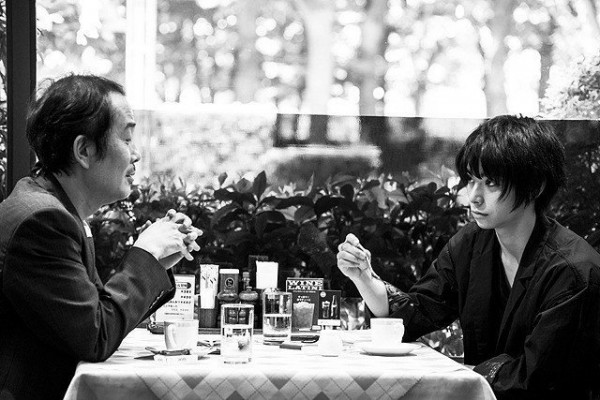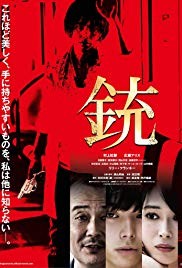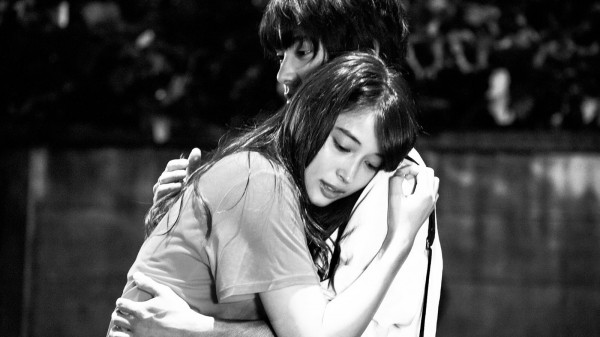-
THE GUN 銃 (Masaharu Take 2018)
MASAHARU TAKE: THE GUN 銃 (2018)

LILY FRANKY AND NIJIRO MURAKAMI IN THE GUN
Chekhov's gun rule observed
One senses a nihilistic streak in Japanese culture and aimless university student Toru Nishikawa (Nijir˘ Murakami) has one that gets a dangerous boost when he comes across a pistol by the riverside one night, takes it home, and begins polishing and admiring it. It's a handsome .357 magnum, and it's loaded with bullets. Toru lives alone. He has a pal at the fac, a cheerful boy in a pork pie hat who wants to join him in picking up babes, but Toru keeps his babes to himself. There's one for sex, the other, the emotionally delicate Yukio (Alice Hirose) he really cares about and is shy with. The gun makes Toru feel sexier.
Apparently it's okay to smoke everywhere in Japan, even on the subway. Toru lights up with the satisfying ka-ching of his Zippo every time he goes anywhere, the school cafeteria, cafes with the babes, after sex. We know that Toru, a foster child with little connection to his adopted parents, and here, a proven disinterest in his real father, would rather light up than express his feelings. A voiceover where he narrates helps us guess what's in his head, but just barely.
Next door to Toru's solitary apartment there is a time bomb. A woman moves in who is loudly abusive to her small son. The boy doesn't talk to anybody, but his pain shows to Toru when he leaves behind a plastic bag containing live crayfish with their legs torn off. Toru is watching the irresponsible mother, noting her habits, when she grocery-shops.
This screenplay by the director and Hideki Shishido is a kind of existential horror story. It's also stylish, style taking the place of morality or inner self-worth for the young existential protagonist. In fact Nijiro Murakami is a fashion plate. Waif-cute, a look that the popularity of skating superstar Yuzuru Hanyu showed appeals to Japanese women of all ages, as Toru Nijiro has anime hair and, for summer, wears long white open-top T shirts, loose white blouses, and a long half-length white smock like a lab coat, his slim jeans fashionably rolled at the bottom, black shoes immaculately invisible. Toru starts supplementing his sharp-looking, demonstrably empty day-pack with a black slung pouch containing the pistol, because he decides since he has it, he might as well start carrying it around. It feels so good to have it!
The whole idea of a weapon probably carries a frisson in relatively peaceable Japan that it would lack in the gun-crazy States.
Is it a surprise that somebody notices him when one night he shoots a cat, wearing his white smock, and, wildly excited, runs away from the scene? Soon an umbrella-toting detective shows up at Toru's door. .357 Magnums are a bit thin on the ground in Tokyo, and he left a bullet in the cat that matches the one in the dead man where Toru found the gun. The all-knowing visitor is played by the always excellent Lily Franky, who sets the parameters of the situation with crushing thoroughness in his words to the tight-lipped Toru when they adjourn to a coffee shop. To go out for this interview, Toru dons a black smock instead of the white one, but that doesn't fool the cop. The film suffers from a lack of options. But perhaps that is the point. For Toru, life is a dead end.
As Mark Hadfield noted in his Japan Times review, though The Gun is adapted from a the 2002 debut novel of Fuminori Nakamura, it would "feel familiar" simply if you're read Crime and Punishment or "the works of Albert Camus and Kobo Abe" - though, as Hadfield adds, this movie isn't on that exalted level. It's more simply a mood piece that plays with the sense that youths who aren't motivated at university or have good family backgrounds may be, as it were, loaded guns.
Hiromitsu Nishimura is responsible for the black and white cinematography, which goes well with Murakami's alternately black or white outfits. Sometimes the style seems the only thing, but as Hadfield notes, despite some "weak soundtrack choices," Take sustains a nice combination of tension and despair to the end. The Gun has the qualities of a good short story, and it could come back to haunt you.
The Gun 銃 (Jű), 98 mins., debuted at the Tokyo film festival Nov. 2, 2018 winning the Japanese Cinema Splash Best Director award; Nijir˘ Murakami won the Tokyo Gemstone award for his performance. The Japanese theatrical release was Nov. 17, 2018. Reviewed for Filmleaf as part of the NYAFF, where it has its North American debut.
Sunday, June 30
6:15 PM
Walter Reade Theater


ALICE HIROSE AND NIJIRO MURAKAMI IN THE GUN
Last edited by Chris Knipp; 06-23-2019 at 12:58 AM.
 Posting Permissions
Posting Permissions
- You may not post new threads
- You may not post replies
- You may not post attachments
- You may not edit your posts
-
Forum Rules







 Reply With Quote
Reply With Quote
Bookmarks